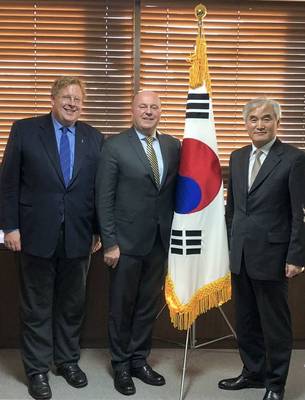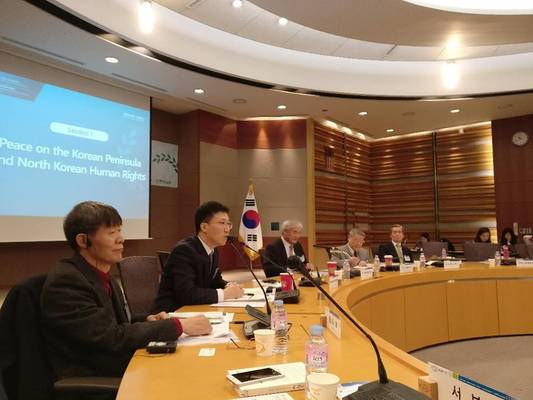Annual Forum of the Korean Institute for National Unification
Chaillot Forum
Dr. Seliger (HSF), Hartmut Koschyk, Co-Chair of the German-Korean bilateral forum, Dr. Son Gi-Woong, President, Korean Institute for National Unification
While the issue of human rights remains extremely contentious between both Koreas, currently it seems to be a consensus in South Korea that there should be neither an overemphasis of human rights on the expense of approaches to peace and dialogue, nor should there be a neglect of human rights to further the dialogue agenda. In practice, the pathway between human rights policy, humanitarian policy, and preparedness against military provocations proves to be extremely difficult and fragile.
This year, the approach of the new government under President Moon Jae-In, to combine the offer of dialogue and cooperation with a firm answer to military provocations was also mirrored in the discussion in the 7th Chaillot Human Rights Forum, which took place at the premises of the KINU (Korean Institute for National Unification) in Seoul on December 5. The conference was opened by Dr. Son Gi-Woong, President of the KINU. After a congratulatory remark by Claire Patricia Fearnley, the Ambassador of New Zealand to the Republic of Korea, Prof. Ra Jong-yil, former Ambassador of Korea to Japan and Great Britain and long term influential thinker on South Korea's North policy, discussed the options of "sunshine" type policies in the current times.
Hartmut Koschyk, long-term Parliamentary point man of Germany for North and South Korea and founder of the One Korea foundation, also attended the conference.
Balancing between Peace and Human Rights
The first session, which was moderated by Dr. Han Dong-ho, Director of the Center for North Korean Human Rights Studies at the KINU, tried to explore the relation of peace on the Korean Peninsula and human rights. Both speakers, Prof. Chung Tai-Uk of Inha University and Prof. Suh Bo-Hyuk of the Seoul National University Institute for Peace and Unification Studies, pleaded for a comprehensive approach to peace and human rights, without giving priority to one on the detriment to the other.
The papers were discussed by Signe Poulsen, Representative at the UN Human Rights Office in Seoul, Kim Tae-Hoon, permanent representative of the Lawyers for Human Rights and Unification of Korea, Choi Ki-Sik, Director of the North Korean Human Rights Documentation Office at the Ministry of Justice, Jongwoo Nam, Director at the Center for North Korean Human Rights Records at the Ministry of Unification as well as Dr. Sookyung Kim, research fellow at the KINU. One contentious question was, how far in the name of flexibility and peace preservation severe human rights violations can be overlooked. Signe Poulsen pointed out the small, but existing opportunities for "partial" human rights dialogue.
Speakers of the first session, Prof. Suh Bo-Hyuk (SNU) and Prof. Chung Tai-Uk (Inha University
"Humanitarian assistance should look into causes"
The second session on "Humanitarian Assistance, Exchange and Cooperation" was moderated by Cho Kun-Sik, distinguished research fellow at the KINU and former vice minister in the Ministry of Unification. Prof. Cho Junghun (director of the Ajou Institute of Unification) looked into a rights-based approach to development and Dr. Lee Kyu-chang (Director of the Unification Policy Division of the KINU), Dr. Bernhard Seliger (of Hanns-Seidel-Foundation Korea), Dr. Kim Young-yoon (President of the Korea Logistics Forum), Kang Young-sik (Secretary-General of the Korean Sharing Movement), Kim Sang-Gook (Director of the Humanitarian Cooperation Planning Division of the Ministry of Unification), as well as Dr. Lee Keum-Soon (senior research fellow at the KINU) discussed the papers.
Dr. Seliger pointed out that humanitarian assistance should try to address not only immediate consequences of failed policies or natural disasters, but should look into root causes. For example, flooding has been a problem in the DPRK in relation to deforestation and natural disasters, with severe damage done to counties in North Hamgyong province in 2016 or to Rason in 2015. Appropriate water and disaster management through afforestation, capacity-building and the introduction of agroforestry can reduce the impact of flooding. Also, it can contribute to improvement of livelihood through the plantation of valuable trees and forest plants and agricultural plants. This, however, falls more into the field of mid- to long-term structural change, which is much more difficult to justify politically with purely humanitarian aid.


